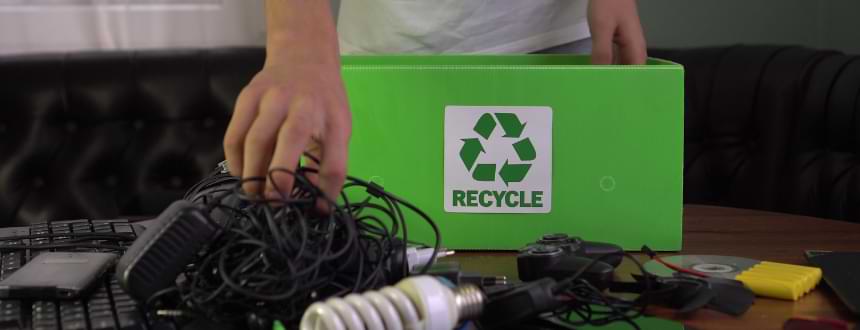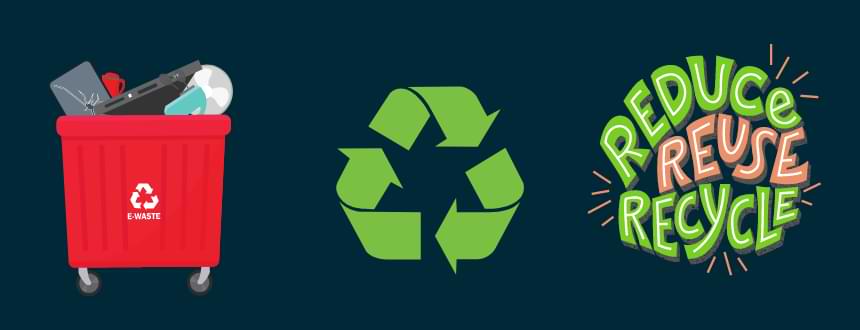Ever wondered the environmental aspect of internet equipment? That’s right.
The truth is, we all have these thoughts in our head that can make it difficult for us to sleep at night. The good news? There are many things you can do about them!
Don’t despair. We’re going to address the environmental aspect of internet equipment and much more in today’s post.
The internet has been a mainstay in our lives for decades now, and there’s no sign of it slowing down. We use the web to stream movies on demand or listen to live music and watch shows from all around the world – even if you’re not young enough to remember before television took over!
The thing about this virtual connection is that with every advancement comes new challenges: some people get their news online while others prefer watching TV; some families share pictures only through social media rather than sending physical postcards anymore… But whether we like them or not (and let’s be honest here), these changes are happening faster than ever before and we just have to keep up!
But it also doesn’t come as a surprise that we end up overlooking the impact of the internet equipment on the environment and all the e-waste.
So let’s discuss in detail the environmental aspect of internet equipment, what these internet equipment are, how we can reuse and recycle our e-waste, and ways to properly dispose of the unwanted equipment.
What’s Electronic Waste?
Materials and Equipment
So what’s electronic waste?
While it’s a more generic term for all the electronic products, we’re going to talk about internet equipment that we use on a daily basis and what goes into making them which is seemingly harming the planet.
The internet is a vast, expansive place that we often don’t take time to appreciate. We need only look at our own personal devices and network equipment for evidence of how much impact they have on the environment- from downloading films or music online; streaming video content like Netflix (which has an hour long carbon footprint), Satellite dish, gaming console emissions when playing games over WiFi networks -to see just some examples!
When considering all this information together it becomes clear why many people want tighter controls over what goes into making these electronic products so as not to harm resources dedicated primarily towards providing us with electricity instead.
Fetching raw materials that are processed in order to make internet equipment is where it all starts from. Plastics are polymers and are one of the many components used in making networking equipment. Needless to say, they are considered extremely harmful for the planet.
Additionally, there is a large amount of energy that goes into extracting and purifying metals such as steel and aluminum. As a matter of fact, extra energy is required to make the alloys that possess characteristics of robustness and flexibility, as well as the processed metal ores that are then used in manufacturing the internet equipment.
In the initial stages of the equipment assembly, which is loaded with heavy metals, often requires cleaning and treatment with toxic solvents. Even though some of the water is cleaned, it still ends up damaging local water supplies.
These electronic waste materials or more specifically internet equipment waste includes :
- Modem
- Satellite Dish
- Wi-Fi Routers
- LAN Cable
- Wi-Fi Pods
- Wi-Fi range extenders/boosters
- Wireless USB Adapter
- Network Switches
Network Equipment Recycling
Network equipment recycling is a complicated process that requires both expertise and machinery. It is also an important industry that specializes in the repair and reconditioning of network devices. The first step in the approach to properly disposing of old networks must begin by identifying what kind of gadgets you have, as well as their potencies or strengths for certain tasks like networking capabilities.
These mostly include modems, routers, switches etc., all parts which are primarily used by residential customers to access data over a phone line or broadband connection at home; they also have other uses such as Voice Over IP (VOIP) telephone services where their functionality has changed but not too drastically.
Can E-waste Be Reused?
So can E-waste be reused? The answer is – yes.
We often think that the pollution caused by the internet that damages the environment mostly comes from big data centers that consume a lot of energy. The reality is a tad different.
If you didn’t know already, the manufacturing of internet equipment and other electronic devices account for the most in the environmental footprint of the internet at a worldwide level.
A lot of the materials used in the manufacturing of these internet equipment can be recycled to extract metals that can be reused.
Use Your Equipment Better
We buy and replace a lot of internet equipment, without realizing and analyzing its necessity and requirement. So, with the aim of heading towards a greener future, the only practice we can put into place is limiting our usage and wastage to reduce the digital footprint.
Here are some of the ways you could use your equipment better :
- Do not replace your digital devices and internet equipment as frequently.
- Instead of replacing your modem with a new one every couple of years, try using it for at least six to eight years.
- Try extending the life of your equipment by taking good care and avoiding damaging them.
- Example : Turn off your internet box when you are not using it, and other devices that could be consuming a lot of energy as well slowly depleting the device.
What is Electronic Waste Management
Sadly true, but we accumulate more and more e-waste than we can possibly handle. All the electronic items that we no longer deem useful are sometimes discarded in ways that can have an adverse impact on the environment.
So what is Electronic waste Management?
In simple words, it’s the process of collecting e-waste so it can either be reused, repaired, recycled or disposed using suitable techniques that mitigate environmental damage.
Let’s look at some of the ways to manage your E-waste :
Make Conscious Purchases
Don’t buy anything you don’t need. Understand the difference between “need” and “want”. Just like you would think twice if not more, before you make a purchase at a clothing store or a retail outlet, think if you need another LAN cable or some fancy new Wi-Fi pods. Unless you think you really need it, don’t make an unnecessary purchase. Re-evaluate your usage because chances are, you probably haven’t. Comeon, there’s no planet B.
Sell Your Pre-Owned Hardware
Hardware is something that many people invest in to make their home or office more comfortable. But if you’re one of those individuals who has been sitting on their old pieces, then now’s the time for a change! You could sell them online through sites like Kijiji and Facebook Market Place so they can find new homes with buyers ready today- not tomorrow when everyone else might be looking too (and prices will likely go up). Not bad right?
Tip : Make sure to always have the model or serial number, date of purchase, and photos of the hardware that accurately represents its condition.
Donation
That’s a big one. The easiest way to get rid of some of the older stuff that you no longer need would be to donate it. You could either donate to social programs or stores that take donations such as Value Village.
Double Check Your E Waste
The next time you’re planning on discarding any type of electronic waste, make sure it’s actually safe and not just old gadgets! Check with your municipality before throwing away anything that might seem like an abandoned or used device.
Can Electronic Waste Be Recycled?
Well, can electronic waste be recycled? Why, absolutely!
There are several e-waste disposal companies that accept pre-owned and redundant electrical and networking equipment rather than dumping them in landfills.
Next time you think your decade-old router lying in the garage is completely superfluous, although arguably not so! Don’t forget that it can be recycled into new products. Different materials mean there are varied uses for e-waste and recycling helps us keep networking equipment from ending up in landfills where they’ll take up space forever while also helping out with pollution problems – who doesn’t want to reduce their carbon footprint?
Now we’re going to answer some burning questions that you may have about E waste recycling and how to go about it :
How E Waste Is Harmful?
Well, E waste is harmful in many ways. The Earth is a precious gem of nature that we need to take care of. We all know about recycling and how important it can be in protecting our environment, but did you also realize what happens when e-waste goes missing?
E waste contains harmful chemicals like cadmium which has been linked with cancer risk or even death from exposure!
Not only does this pose danger on landfills where these metals are released into the air while being incinerated (which poses further risks), they end up harming humans too – primarily through consumption via the food chain.
E Waste In Canada
So what happens to the E waste in Canada?
It sounds like nothing ever changes at this place…but you would be surprised!
Canada is an awesome place for environmentally friendly initiatives. One way this can be seen is in the number of e-recycling and refurbishing facilities available across our great nation! It is estimated that there are more than 150 e-recycling and refurbishing facilities available across Canada.
At this point, we’re sure you’ve heard of the problem with e-waste. It’s an expanding database that Canada is having trouble dealing with and it will be too late if they don’t take action soon! The good news? There may still be time to stop these harmful materials from continuing down their destructive path by diverting them where they need go instead – like China or Dubai for instance (or any other country)!
Used Network Equipment Canada
There’s many places in Canada that will help recycle used network equipment.
Well, if you have a bunch of network switches taking up space in your home office that is slowly turning into a storage room or an obsolete modem that isn’t being used then these places will come in handy :
reBOOT Canada
reBOOT Canada is a non-profit organization that provides internet access for those who wouldn’t otherwise be able to afford it. A registered charity based in Ontario, reBoot’s mission statement says they want people from under-served communities and individuals across the country connected with digital tools so they can build their own self-sufficiency skills while also improving employment prospects through education opportunities!
Recycle My Electronics
Recycle My Electronics, a not-for-profit organization has been providing Canadian businesses and residents with customized solutions for over a decade. They pride themselves on being industry-led, not just in their business operations but also through partnerships that help them set best practices across many aspects of recycling – from processing to transportation or drop off locations!
UsedServers.ca
UsedServers.ca has been providing the best equipment to users in Montreal for years. They are committed not only to delivering quality but also at affordable prices, which makes them one of many go-to businesses when the time comes to make purchases or sell your old items!
Conclusion : The Environmental Aspect of Internet Equipment
We hope this article was insightful and might help you next time when thinking about shoving your internet equipment in a box without disposing of it properly!
The environmental aspect of internet equipment is not something that we often think about. We just use all these networking equipment without giving much regard as to how they affect people or nature in general, but there are some major consequences for the planet, us individuals and society at large if this issue isn’t addressed properly.
Lastly, we at Planhub want to hear what you think!
Let us know if there’s anything else on your mind or any other feedback or tips that you would like to share or that would help shape this story.
Until then, Reduce, Reuse and Recycle!








